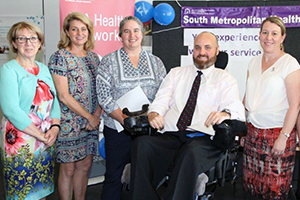DAIP initiatives
 Collaborating and consulting with consumers with lived experience of disability to plan and evaluate service delivery is, and will continue to be a focus for SMHS.
Collaborating and consulting with consumers with lived experience of disability to plan and evaluate service delivery is, and will continue to be a focus for SMHS.
In line with the SMHS Disability Access and Inclusion Plan 2022-2027 (PDF 278KB) the importance of providing more accessible and inclusive care is demonstrated by the recent initiatives and activities.
Outcome 1
People with disabilities have the same opportunities as other people to access the services of, and events organised by, a public authority.
In collaboration with the WA Disability Health Network, SMHS once again co-hosted an event to celebrate International Day of People with Disability on 3 December 2019. Over 100 people attended Fiona Stanley Hospital to hear from consumers who shared their shared their stories of living with disability and speakers from Department of Health and Department of Communities.
Outcome 2
People with disabilities have the same opportunities as other people to access the buildings and other facilities of a public authority.
In response to the COVID-19 pandemic, easily accessible COVID clinics were established at FSH and RGH ensuring all members of the community including people with disability had access to testing, information and support.
Signage to the RkPG inpatient and outpatient mental health units was reviewed and improved to meet Australian standards to assist people with intellectual, cognitive and sensory disabilities to access the facilities and services they require.
Outcome 3
People with disabilities receive information from a public authority in a format that will enable them to access the information as readily as other people are able to access it.
In collaboration with the Health Consumers’ Council (WA) Inc, People with Disability WA and a working group of people with disability, a suite of health consumer resources were developed. These resources are accessible in plain English, easy-read, plaint text and video formats and were made available to the community using SMHS services, including those with disability, via:
- websites for Fiona Stanley Fremantle Hospitals Group (external site) and Rockingham Peel Group (external site)
- the Health Consumers’ Council.
Outcome 4
People with disabilities receive the same level and quality of service from the staff of a public authority as other people receive from the staff of that public authority.
In partnership with the Health Consumers’ Council (WA) and People with Disability WA, SMHS hosted a diversity dialogue forum at Fiona Stanley Hospital as part of the Empowering Health Consumers project. The forum involved discussion on the topic of 'delivering safe, quality care for people with disability' with a panel of consumers and community members living with disability. This was an opportunity for health staff to gain insight specific issues relevant to people with disability when accessing and receiving health care.
Outcome 5
People with disabilities have the same opportunities as other people to make complaints to a public authority.
Fiona Stanley Fremantle Hospital Group (FSFHG) developed an online feedback form to enhance the way patients with disability and their families can provide feedback about their experiences with FSFHG services.
Outcome 6
People with disabilities have the same opportunities as other people to participate in any public consultation by a public authority.
A consumer presentation at the SMHS Disability Advisory Network in 2019 highlighted opportunity areas for SMHS when employing people with disability. This important consumer feedback is being used to inform and guide the development of initiatives to increase employment opportunities for people with disability in SMHS.
Outcome 7
People with disability have the same opportunities as other people to obtain and maintain employment.
The implementation of the SMHS Reasonable Adjustment Guidelines provides information and direction to managers, supervisors and employees when workplace adjustments are necessary to enable an employee with a disability to carry out their duties effectively. The guidelines provide SMHS the opportunity to optimise the employees’ ability to perform the role, while ensuring safety.

